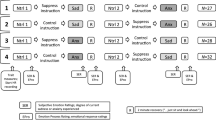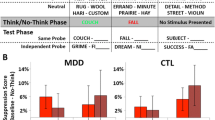Abstract
The hypothesis was that, due to the increased accessibility of material congruent with current mood, mood-congruent thoughts would be more likely to intrude than mood-incongruent thoughts during a period of thought suppression. In Study 1, subjects were led to experience either positive or negative mood and were then asked not to think about either a positive or negative event drawn from their own pasts. As predicted, positive-mood subjects exhibited more intrusions for positive than negative unwanted thoughts, whereas negative-mood subjects exhibited more intrusions for negative than positive unwanted thoughts. These findings were replicated in Study 2 in which dysphoric and nondysphoric subjects suppressed thoughts of an autobiographical event that was either positive or negative. Results are discussed with respect to the relation between mood and cognition, the role of intrusive cognitions in depression, and the relative merits of successful and unsuccessful thought suppression.
Similar content being viewed by others
References
Bargh, J. A., & Tota, M. E. (1988). Context-dependent automatic processing in depression: Accessibility of negative constructs with regard to self but not others.Journal of Personality and Social Psychology, 54 925–939.
Beck, A. T., Rush, A. J., Shaw, B. F., & Emery, G. (1979).Cognitive therapy of depression. New York: Guilford Press.
Beck, A. T., Ward, C. M., Mendelson, M., Mock, J. E., & Erbaugh, J. K. (1961). An inventory for measuring depression.Archives of General Psychiatry, 4 561–571.
Blaney, P. H. (1986). Affect and memory: A review.Psychological Bulletin, 99 229–246.
Bower, G. H. (1981). Mood and memory.American Psychologist, 36 129–148.
Bower, G. H., & Cohen, R. R. (1982). Emotional influences in memory and thinking: Data and theory. In S. Fiske & M. Clark (Eds.),Affect and social cognition. Hillsdale, NJ: Erlbaum.
Clark, D. M., Ball, S., & Pape, D. (1991). An experimental investigation of thought suppression.Behaviour Research and Therapy, 29 253–257.
Clark, M. S., & Isen, A. M. (1982). Toward understanding the relationship between feeling states and social behaviors. In A. H. Hastorf & A. M. Isen (Eds.),Cognitive social psychology (pp. 73–108). New York: Elsevier/North-Holland.
Cohen, J. (1977).Statistical power analysis for the behavioral sciences (2nd ed.). New York: Academic Press.
Conway, M., Howell, A., & Giannopoulos, D. (1991). Dysphoria and thought suppression.Cognitive Therapy and Research, 15 153–166.
Dalgeish, T., & Watts, F. N. (1990). Biases of attention and memory in disorders of anxiety and depression.Clinical Psychology Review, 10 589–604.
Diener, E., & Iran-Nejad, A. (1986). The relationship in experience between various types of affect.Journal of Personality and Social Psychology, 50 1031–1038.
Depue, R. A., & Monroe, S. M. (1978). Learned helplessness in the perspective of the depressive disorders: Conceptual and definitional issues.Journal of Abnormal Psychology, 87 3–20.
Ellis, H. C., & Ashbrook, P. W. (1988). Resource allocation model of the effects of depressed mood states on memory. In K. Fiedler & J. Forgas (Eds.),Affect, cognition and social behavior. Hogrefe: Toronto.
Ericsson, K. A., & Simon, H. A. (1984).Protocol analysis: Verbal reports as data. Cambridge, MA: MIT Press.
Forgas, J., & Bower, G. H. (1988). Affect in social and personal judgments. In K. Fiedler & J. Forgas (Eds.),Affect, cognition, and social behavior (pp. 183–208). Toronto: Hogrefe.
Genest, M., & Turk, D. C. (1981). Think-aloud approaches to cognitive assessment. In T. V. Merluzzi, C. R. Glass, & M. Genest (Eds.),Cognitive assessment. New York: Guilford Press.
Gilligan, S. G., & Bower, G. H. (1984). Cognitive consequences of emotional arousal. In C. Izard, J. Kagen, & R. Zajonc (Eds.),Emotions, cognition, and behavior. New York: Cambridge University Press.
Goodwin, A. M., & Williams, J. M. G. (1982). Mood-induction research: Its implications for clinical depression.Behaviour Research and Therapy, 20 373–382.
Gotlib, I. H., & McCann, C. D. (1984). Construct accessibility and depression: An examination of cognitive and affective factors.Journal of Personality and Social Psychology, 47 427–439.
Horowitz, M. J. (1975). Intrusive and repetitive thoughts after experimental stress.Archives of General Psychiatry, 32 1457–1463.
Horowitz, M. J. (1983). Psychological response to serious life events. In S. Breznitz (Ed.),The denial of stress (pp. 129–159). New York: International Universities Press.
Kendall, P. C., Hollon, S., Beck, A. T., Hammen, C., & Ingram, R. (1987). Issues and recommendations regarding use of the Beck Depression Inventory.Cognitive Therapy and Research, 11 289–299.
Lazarus, R. S. (1983). The costs and benefits of denial. In S. Breznitz (Ed.),The denial of stress (pp. 1–30). New York: International Universities Press.
Martin, L. L., & Tesser, A. (1989). Toward a motivational and structural theory of ruminative thought. In J. S. Uleman & J. A. Bargh (Eds.),Unintended thought: The limits of awareness, intention, and control (pp. 306–326). New York: Guilford Press.
McCabe, S. B., & Gotlib, I. H. (1989).Construct accessibility and dichotic listening in clinically depressed subjects. Paper presented at the annual convention of the Canadian Psychological Association, Halifax.
Mikulincer, M. (1989). Cognitive interference and learned helplessness: The effects of off-task cognitions on performance following unsolvable problems.Journal of Personality and Social Psychology, 57 129–135.
Mikulincer, M., & Nizan, B. (1988). Causal attribution, cognitive interference, and the generalization of learned helplessness.Journal of Personality and Social Psychology, 55 470–478.
Nelson, R. E., & Craighead, W. E. (1977). Selective recall of positive and negative feedback, self-control behaviors, and depression.Journal of Abnormal Psychology, 86 379–388.
Pennebaker, J. W., & Hoover, C. W. (1985). Inhibition and cognition: Toward an understanding of trauma and disease. In R. J. Davidson, G. E. Schwartz, & D. Shapiro (Eds.),Consciousness and self-regulation: Vol. 4. New York: Plenum Press.
Pignatiello, M. F., Camp, C. J., & Rasar, L. A. (1986). Musical mood induction: An alternative to the Velten Technique.Journal of Abnormal Psychology, 95 295–297.
Pope, K. S. (1978). How gender, solitude, and posture influence the stream of consciousness. In K. S. Pope & J. L. Singer (Eds.),The stream of consciousness (pp. 259–299). New York: Plenum Press.
Rosenthal, R., & Rosnow, R. L. (1984).Essentials of behavioral research: Methods and data analysis. New York: McGraw-Hill.
Rosnow, R. L., & Rosenthal, R. (1988). Focused tests of significance and effect size estimation in counseling psychology.Journal of Counseling Psychology, 35 203–208.
Rosnow, R. L., & Rosenthal, R. (1989a). Definition and interpretation of interaction effects.Psychological Bulletin, 105 143–146.
Rosnow, R. L., & Rosenthal, R. (1989b). Statistical procedures and the justification of knowledge in psychological science.American Psychologist, 44 1276–1284.
Singer, J. A., & Salovey, P. (1988). Mood and memory: Evaluating the network theory of affect.Clinical Psychology Review, 8 211–251.
Strack, S., Blaney, P. H., Ganellen, R. J., & Coyne, J. C. (1985). Pessimistic self-preoccupation, performance deficits, and depression.Journal of Personality and Social Psychology, 49 1076–1085.
Sullivan, M. J. L., & Conway, M. (1989). Negative affect leads to low-effort cognition: Attributional processing for observed social behavior.Social Cognition, 7 315–337.
Taylor, S. E., & Brown, J. (1988). Illusion and well-being: A social psychological perspective on mental health.Psychological Bulletin, 103 193–210.
Taylor, S. E., & Schneider, S. K. (1989). Coping and the simulation of events.Social Cognition, 7 174–194.
Watson, D., & Tellegen, A. (1985). Toward a consensual structure of mood.Psychological Bulletin, 98 219–235.
Wegner, D. M. (1988). Stress and mental control. In S. Fisher & J. Reason (Eds.),Handbook of life stress, cognition and health (pp. 683–697). New York: Wiley.
Wegner, D. M. (1989).White bears and other unwanted thoughts: Suppression, obsession, and the psychology of mental control. New York: Viking.
Wegner, D. M., & Schneider, D. J. (1989). Mental control: The war of the ghosts in the machine. In J. S. Uleman & J. A. Bargh (Eds.),Unintended thought: The limits of awareness, intention, and control (pp. 287–306). New York: Guilford Press.
Wegner, D. M., Schneider, D. J., Carter, S. R., & White, T. L. (1987). Paradoxical effects of thought suppression.Journal of Personality and Social Psychology, 53 5–13.
Wegner, D. M., Schneider, D. J., Knutson, B., & McMahon, S. R. (1991). Polluting the stream of consciousness: The effect of thought suppression on the mind's environment.Cognitive Therapy and Research, 15 141–152.
Wegner, D. M., Shortt, J. W., Blake, A. W., & Page, M. S. (1990). The suppression of exciting thoughts.Journal of Personality and Social Psychology, 58 409–418.
Wenzlaff, R. M., Wegner, D. M., & Klein, S. B. (1991). The role of thought suppression in the bonding of thought and mood.Journal of Personality and Social Psychology, 60 500–508.
Wenzlaff, R. M., Wegner, D. M., & Roper, D. W. (1988). Depression and mental control: The resurgence of unwanted negative thoughts.Journal of Personality and Social Psychology, 55 882–892.
Williams, J. M. G., & Nulty, D. D. (1986). Construct accessibility, depression, and the emotional Stroop task: Transient mood or stable structure?Personality and Individual Differences, 7 485–491.
Author information
Authors and Affiliations
Additional information
The article is based on portions of a dissertation by Andrew Howell submitted to Concordia University in partial fulfillment of the degree of Doctor of Philosophy. The research was conducted while Andrew Howell was holding a Social Sciences and Humanities Research Council of Canada (SSHRCC) doctoral fellowship, and was supported by SSHRCC and Fonds pour la Formation de Chercheurs et l'Aide à la Recherche of Quebec (FCAR) research grants to Michael Conway.
Rights and permissions
About this article
Cite this article
Howell, A., Conway, M. Mood and the suppression of positive and negative self-referent thoughts. Cogn Ther Res 16, 535–555 (1992). https://doi.org/10.1007/BF01175140
Issue Date:
DOI: https://doi.org/10.1007/BF01175140




